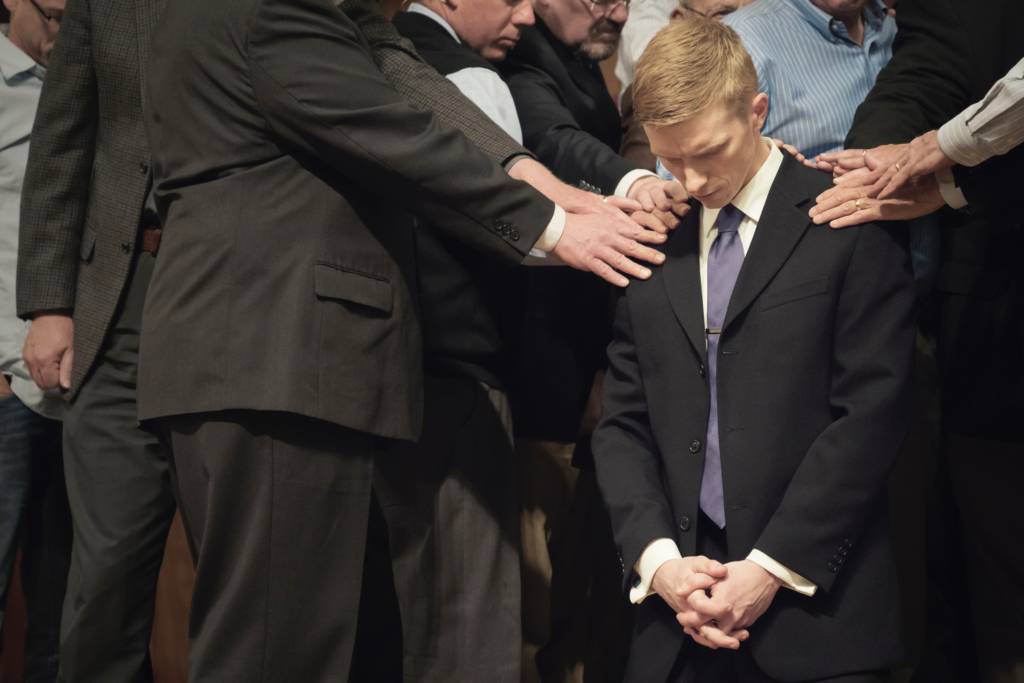When it comes to churches’ positions on women in ministry (and other things), I have come to appreciate transparency and a sense of owning doctrine. This is what we believe, and here it is in black and white.
Unfortunately, this doesn’t happen nearly as much as it should.
There are so many churches that do not hire/ordain women as pastors or elders (or, in some cases, deacons). But it’s not like they talk about it – that would be too awkward! (“Who would come back to our church if we stood up there and actually said out loud that women can’t be pastors and elders?!”)
Instead, us women get to absorb this message through osmosis, Sunday after Sunday, year after year. Like when new elders are ordained, and the whole group is up on stage, and it’s a homogenous pack of (typically white, typically married, definitely straight) men. No one says why. No one attempts to justify it. No one even mentions it. There’s simply a visual reminder of the church hierarchy, and that says it all.

You can skate by without saying it — I do not permit a woman to teach or to exercise authority over a man; rather, she is to remain quiet – because our eyes say it very loudly for you.
We just sit there and watch, swallowing everything. Our pain, our confusion, our questions, our humanity. I’ve never felt so invisible as in those instances in which it was communicated, with zero words, that my female body excludes me from influence and leadership.
So it’s really difficult to have a productive outlet for our anger about this systematic exclusion, because if we say anything to the church leadership, we are likely to be met with a non-threatening, puzzled expression, coupled with kind, loving words, and we might even end up feeling like we’re overreacting or out of line, because the pastor or elder is just so nice.
“Oh no! Why are you so upset? No one said anything about women.” Right! No one said anything about women – that’s the problem!
(*pulls out hair and screams, rips church bulletin into tiny pieces and throws them in the air* — wouldn’t it feel amazing to really do that? But, if you do, you’ll be immediately dismissed as an “emotional woman.”*goes home and pours hard liquor*).
The problem is not the people who ARE ordained, the problem is the people who aren’t. I’m so tired of hearing about how male elders are really good men. Yes, that’s often true! (But not always). I know a lot of completely wonderful male pastors and elders who are clearly gifted and doing a lot of good for the Church. That’s not the point.
Stop centering men in this discussion.

Complementarianism goes down a lot easier when it is soft. When the men in charge are so thoughtful and loving and kind. (And, again, they truly are! In its best versions, complementarian churches have genuinely amazing leadership. In other words, I don’t mean “thoughtful” or “loving.” I mean thoughtful and loving.)
However – because the leading men are often really great people, it becomes that much easier for complementarian churches to pat themselves on the back about how much they love women, and it becomes that much less likely that complementarian churches will ever reconsider their theology.
- We don’t bar women from speaking up front.
- We don’t stop women from sharing their testimonies.
- We don’t refuse to let women pray publicly.
- We don’t prevent women from leading worship.
- We don’t restrict women from leading house groups.
- We have women deacons!
- We are complementarian, not patriarchal.
In other words, we aren’t like those bad people over there who oppress women.
Guys? Giving yourself credit for being less overtly patriarchal than others is not a good benchmark for respecting women (also, yes, we want your respect. Love is great, but we want respect too. When you love us without respecting us, it’s condescending and infantilizing).
I mean, sure, you’re not the worst ones out there. Good job. But you don’t ordain women as elders. You don’t ordain women as pastors. You don’t permit women to be in charge. You have a red line that will not be crossed – and it’s power and authority.

All the stuff you “let” women do, it’s all things that don’t threaten your privilege and your position. Think about that.
In nearly every single interaction I’ve ever had with a male pastor/elder, you are absolutely so sweet and so kind. Almost always, I have felt your care for me. And I want to give you the benefit of the doubt that, for the most part, for most of you, you have no conscious agenda to keep women down.
You’re simply very privileged, and you don’t see that (which is great evidence of your privilege). Think about that.
The benchmark for respecting women should not be patriarchy-lite. It should not be a toned-down, prettied-up, sugarcoated version of the same oppression women have suffered for millennia all over the world. When the oppression of women is gentle, and kind, and loving, or even totally unintentional, it. is. still. oppression.
“Patriarchy is not God’s dream for humanity.” — Sarah Bessey

I know, I know – “it’s in the Bible.” We’ll get to that. For now, just sit with the discomfort that while you do your best to adhere to Scripture, you simultaneously hurt women.
Also – men don’t get to decide what is patriarchy. Women do. Full stop. And complementarianism, no matter how soft, is patriarchy. It’s subtle, it’s under the radar, it’s nice – it’s patriarchy. It makes me less human than you. That’s it.
You can rule with a fist, or you can rule with a smile, but you’re still ruling, and we’re still not.
Also – your theology of gender roles is a house of cards. When women pray and speak and lead worship and lead house groups and share with the congregation, that’s teaching. Teaching men (gasp!). Either you’re okay with it or you aren’t.
Also – my emotions don’t make me dismissible. They don’t mean I am out of control. It’s easy for you to hold it together and remain sweet and kind – you’re not the one being oppressed. Think about that.
We’re angry for a really good reason. Think about that.
Also – I really do believe that the vast majority of male church leaders are good-hearted people. I could rattle off ten right now. Therefore I know some of you feel something deep in your gut, some repressed unease with this whole power dynamic, some buried intuition that this is deeply unjust. Patriarchy puts you in a box, but maybe you’d love to jump out. I’ll keep speaking up. Will you?

The benchmark for respecting women is fully elevating and fully including women, giving us just as much power as you have, and not a teaspoon less. The benchmark is equity and ultimately justice. The benchmark is giving away your privilege.
You can keep all that sugar. We’d rather have the pulpit.
For additional reading: (I have a lot to say about patriarchy and gender roles and my story as a woman in the church — over the course of these posts, I will be sharing all the books I read on my journey. I hope they are helpful).
- Jesus Feminist by Sarah Bessey
- A Year of Biblical Womanhood by Rachel Held Evans
- How I Changed My Mind About Women in Leadership by a collective of evangelicals
Photo credits in order:
- Photo by Marc Scaturro on Unsplash
- Photo by Amy Humphries on Unsplash
- Photo by Stephen Radford on Unsplash
- Photo by Conor Brown on Unsplash
- Photo by Eric X on Unsplash

2 Comments
Well said. It has taken me a long time actually learn to listen to the marginalized party. I’ve always loved the idea, but realized recently (with women pastors and non-whites in my Presbytery) that there are old, sinister voices that argue with them even as they are talking and if I don’t quiet them I will either think or speak patronizingly.
That’s awesome self-awareness, my friend. Thank you for quieting those voices and working to uplift the marginalized. <3
Comments are closed.